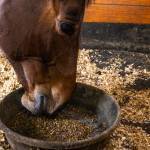Question
My Quarter Horse mare (six years old; 800 lb or 365 kg) is ridden twice or three times a month. She’s turned out for eight hours each day, and she spends the remainder of her day in a stall. She is fed 2 lb (1 kg) of a low-starch feed twice a day with ground flax and probiotics. She is also given two flakes of grass hay and three flakes of alfalfa each day. Do you have any idea as to why she would be prone to gas colic based on her diet and management? How do I feed to avoid it?
Answer
There are several possible causes of gas colic. Here are some thoughts:
1. Is there any possibility that your mare could have 24-hour turnout or spend a lot less time in a stall? For horses that are prone to gas colic, free movement seems to help prevent frequent buildup of gas in the intestine because locomotion promotes peristalsis, the wavelike muscle contractions that help move ingesta through the gastrointestinal tract. More frequent structured exercise may be helpful as well.
2. Because your mare is not heavily exercised, perhaps she could do with a ration balancer instead of a concentrate like the low-starch feed you described in your question. The feeding rate would be about 0.5 lb per day total and would supply all the protein, vitamins, and minerals she requires for her well-being. By decreasing the amount of concentrate, it would reduce the amount of grain and therefore the total starch in the diet, which may be the cause of the gassiness.
As you decrease the calories derived from concentrate, you should increase the calories from forage by offering more hay. Ration balancers are available at most feed stores.
3. Some horses are sensitive to alfalfa and tend to be gassier when ingesting it. You could try decreasing the amount of alfalfa and increasing the amount of grass hay.
4. Sometimes gassiness is the result of low pH in the hindgut. KER has a supplement called EquiShure that acts as a hindgut buffer, boosting the pH of the hindgut. Even though your mare’s current diet is not high in starch, sometimes any starch is enough to have an effect on the delicate intestinal balance of sensitive horses. Some horses have significant improvement of gassiness with EquiShure.








